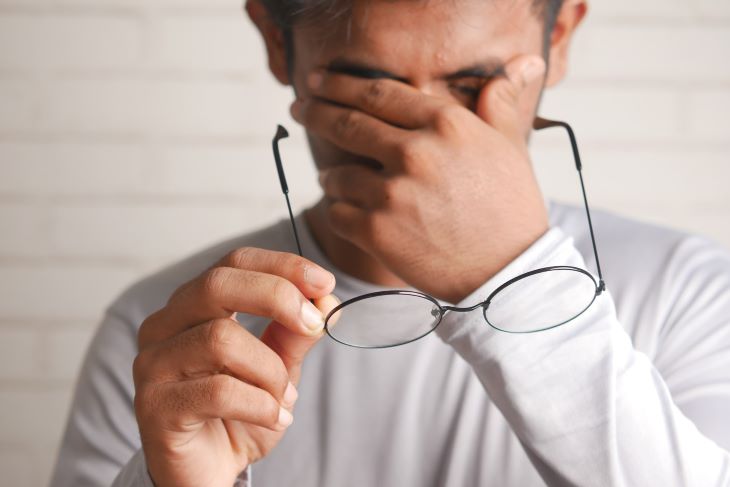Sleeping pills can feel like a lifesaver for those of us who suffer from chronic insomnia.
However, this type of medication comes with a risk of overdose if not taken correctly.
Sleeping pills: types, effects and risks

What are sleeping pills and why are they used?
Sleeping pills are a type of medication which can induce drowsiness. They are a form of sedative and can be prescribed or purchased over-the-counter.
Other names for sleeping pills include:
- Sleep aids
- Hypnotics
- Tranquillizers
Sleeping pills are commonly used to treat insomnia, which is when someone has trouble falling or staying asleep. [1]
In some cases, they may also be used to treat certain forms of anxiety.
If you are having trouble sleeping, speak to your doctor about the possibility of using sleeping pills.
This medication isn’t suitable for everyone, so it’s important that you ensure it will be safe and effective for you.
How do sleeping pills work?
The type of sleeping pill you take will determine how it will work in your body and brain.
In general, there are three different types of sleeping pills and each work in different ways.
- Melatonin receptor agonists cause the brain to produce an excess amount of melatonin, which helps you to fall asleep and stay asleep for longer.
- GABA agonists cause the brain to produce more gamma-aminobutyric acid (GABA) which can help to slow down your central nervous system and make you feel sleepy.
- Orexin receptor antagonists inhibit the neurotransmitters in the brain that cause you to feel awake.
You may need to try a few different types of sleeping pill before you find one that best suits you.
How long do sleeping pills take to kick in?
Most sleeping pills will begin to take effect within 20-30 minutes. [2]
Before they cause you to fall asleep, you may find that it becomes difficult to think clearly and you may be unsteady on your feet.
As a result, it’s important that you are prepared and ready for bed before taking them. Do not take sleeping pills before cooking a meal, driving a vehicle or while taking care of children.
What are the side effects of sleeping pills?
While sleeping pills can be effective in helping you sleep at night, they can also come with several unpleasant side effects that may trouble you during the day.
Common side effects of sleeping pills include:
- Gastrointestinal problems such as constipation or diarrhoea
- Constant dry mouth
- Weak muscles
- Heartburn
- Frequent headaches
- Waves of nausea
- Chronic gas
Speak to your doctor if you are struggling to cope with the side effects of a certain type of sleeping pill, and they may be able to recommend something else that is more suitable for you.
Sleeping pill overdose risk

Can you overdose on sleeping pills?
When used as directed, sleeping pills can be a safe and effective way to get a good night’s sleep.
However, it’s important to understand that it is possible to overdose on sleeping pills. This is true even if you have been prescribed this medication by your doctor.
Over the years, the number of people overdosing on sleeping pills has increased. The majority of these people require urgent medical attention as the risk of death is high in this situation.
If you take too many sleeping pills or combine them with alcohol or other drugs such as benzodiazepines, you are more at risk of experiencing a sleeping pill overdose. [3]
You should always follow instructions when taking sleeping pills, and make sure to read as much information about them in order to avoid a potentially dangerous situation.
What can happen if you overdose on sleeping pills?
Much like alcohol, sleeping pills are a form of depressant. This means they slow down your central nervous system and bodily functions.
If you take too many sleeping pills or combine them with another drug, your body and brain may slow down or even stop working altogether.
Many of our unconscious behaviours such as breathing and keeping our heart beating depend on our brain functioning correctly.
If your brain slows down too much, you may stop breathing and your heart may stop beating. This can lead to severe brain damage and even death.
What are the signs of a sleeping pill overdose?
A sleeping pill overdose may be accidental or deliberate.
Some people attempt to end their lives by taking an overdose of sleeping pills, while others accidentally take too many or combine them with alcohol or other drugs.
It’s crucial that you know how to recognise the signs of a sleeping pill overdose in case you or someone else ever ends up in this dangerous situation.
Common signs of a sleeping pill overdose include:
- Breathing slowly
- Slow heart rate
- Feeling dizzy and/or fainting
- Slurring their words
- Vomiting
- Difficulty thinking clearly
- Blue tinge to their lips, fingers or skin
- Feeling cold to the touch
- Unsteady on their feet
- Complete unconsciousness
If you are concerned that someone else has taken a sleeping pill overdose, call 999 immediately and let the medical team know what type of sleeping pill they have taken along with any other substances and the approximate dosage.
Try to keep them awake and talking if possible, but if they are unconscious then you should lay them on their side in the recovery position until help arrives.
What are the risk factors of a sleeping pill overdose?
Some people are at a greater risk of experiencing a sleeping pill overdose than others, and this is due to several risk factors that may be present.
Common risk factors that may contribute to a sleeping pill overdose include:
- You have an addiction or history of addiction
- You are taking any other medication
- You have reacted badly to sleeping pills in the past
- You are taking sleeping pills that have not been prescribed to you
- You are taking sleeping pills recreationally
If you recognise any of the above risk factors in yourself, sleeping pills may not be a suitable form of treatment for you.
Speak to your doctor about your concerns and they will be able to suggest alternative treatment methods.
How is a sleeping pill overdose treated?
It can be very scary if you or someone you know is suffering from a sleeping pill overdose, and calling emergency services as well as poison control is the most effective way to get the help that you need.
The primary objective when treating a sleeping pill overdose is to get the medication out of your system if possible.
This may include using activated charcoal to make you vomit, or alternatively, your stomach may be pumped.
You may also be given a medication called flumazenil which can reverse sedation, but this is not often used as there is a risk of seizures and heart disorders.
The only thing that can completely treat a sleeping pill overdose is time, and you will be closely monitored as the drug slowly leaves your system.
How can I prevent a sleeping pill overdose?
Although you may feel worried, a sleeping pill overdose is not inevitable.
By following a few simple tips you can greatly reduce your chances of overdose and ensure that you are using them safely:
- Follow instructions from the manufacturer and your doctor
- It’s important that you follow all instructions given to you by the manufacturer and your doctor.
- You should not attempt to change your dosage without permission from your doctor. Even if you are having a particularly bad night, stick to the instructions that you have been given.
- Don’t combine sleeping pills with other substances
- As mentioned above, it can be very dangerous to combine sleeping pills with other drugs.
- This includes alcohol and benzodiazepines, two strong sedatives that when combined with sleeping pills can cause your body to shut down.
- Let your doctor know if they aren’t working for you
- It’s possible that over time your body may build up a tolerance to sleeping pills and your usual dosage may not produce the same effects.
- You may also find that you dislike the side effects of a particular brand of sleeping pill, and may experience severe drowsiness throughout the day.
- If either of these scenarios occur, speak to your doctor and let them know.
- Try other alternatives and healthy habits
- Alongside sleeping pills, certain healthy habits can improve your sleep and reduce the risk that you will attempt to increase your dosage.
- Make sure to get fresh air and sunlight each day, as well as exercising regularly and eating a healthy diet.
- Brush up on your sleep hygiene too – try winding down an hour before bed with a warm drink and a bath, and avoiding screens during the late evening.
Understanding sleeping pill addiction

Is it possible to become addicted to sleeping pills?
If you are using sleeping pills exactly as prescribed, it is unlikely that you will become addicted.
However, if you increase your dosage without approval from your doctor or use sleeping pills recreationally, it is possible to become addicted to this medication. [4]
An addiction to sleeping pills can happen so slowly that it is difficult to know what is happening. You may begin taking more pills than usual if your insomnia is particularly bad, or take them more frequently as you enjoy the sensation.
Some people also mix them with alcohol or other drugs to increase the effects, a dangerous practice that also increases the risk of addiction.
An addiction to sleeping pills can impact every part of your life, from your finances to your health to your relationships.
What are the signs and symptoms of a sleeping pill addiction?
An addiction can be so hidden that even someone with an addiction may not even be aware of it.
There are certain signs that you can look out for if you are concerned that you or someone else may have an addiction to sleeping pills.
Common signs and symptoms of a sleeping pill addiction include:
- Being unable to sleep or relax without using sleeping pills
- Feeling extremely groggy and tired throughout the day
- Being unsteady on your feet and having trouble balancing
- Anxiety, depression and/or suicidal thoughts
- Withdrawing from friends and family
- Prioritising using sleeping pills above everything else
- Lying about your sleeping pill use to others
- Being unable to imagine life without sleeping pills
- Experiencing cravings for sleeping pills
It is possible to treat a sleeping pill addiction and recover safely, and the chances of long-term recovery are greatly increased when the addiction is recognised early on and professional treatment is sought.
How is a sleeping pill addiction treated?
If you have a sleeping pill addiction, it’s important that you receive the right help and support as quickly as possible.
This is because it is possible to experience a sleeping pill overdose, which can be fatal.
It is recommended that you find a rehab clinic that specialises in treating sleeping pill addiction, and this may be inpatientor outpatient depending on your needs.
At rehab you will complete a supervised detox which takes around one week. This involves slowly flushing all traces of sleeping pills out of your system and treating any withdrawal symptoms that may arise.
You will then attend counselling for at least three weeks, to help with the psychological dependence on sleeping pills and to learn more positive behaviours and healthy ways of coping.
Following rehab you will be encouraged to get involved with any aftercare services in your area such as 12 Step programmes, ongoing counselling and alumni programmes to increase your chances of long-term recovery.
Frequently asked questions about sleeping pills

Can I use sleeping pills if I am pregnant or breastfeeding?
It is not recommended to use prescription sleeping pills while pregnant or breastfeeding. For many brands, there is not enough scientific research to prove whether they are safe in this situation, while other brands have been found to be dangerous.
Some of the effects that sleeping pills can have on unborn or newborn babies include:
- Low birth weight
- Higher chance of caesarean birth
- Breathing difficulties
- Smaller size
There are some over-the-counter sleeping pills that may be safe to use while pregnant or breastfeeding, but you should always speak to your doctor before using them or any other type of medication or supplement.
Even if a certain brand of sleeping pill is recommended by your doctor while you are pregnant or breastfeeding, you must still take care to follow all instructions.
Is it safe to give sleeping pills to a child?
In most cases, doctors do not recommend giving sleeping pills to a child as this can be potentially dangerous.
Instead, they may prescribe a milder sedative or a course of melatonin.
if your child is having trouble sleeping, you may wish to try several natural remedies to help with their insomnia.
These may include:
- No caffeine (including chocolate and certain fizzy drinks)
- Less screen time
- Exercising more
- Eating a healthy and varied diet
- Taking a warm bath before bed
In some cases, your child’s sleep problems could potentially stem from an undiagnosed disorder such as autism or ADHD.
If you suspect that they may have one of these conditions, speak to your doctor to arrange a professional assessment.
Can you die from using sleeping pills?
Yes, it is possible to die from using sleeping pills if you suffer from an overdose.
Generally, sleeping pills are relatively safe if all instructions are carefully followed and you have prescribed this medication by a doctor.
But when sleeping pills are used recreationally, at too high of a dosage or alongside other drugs and alcohol then the risk of overdose and potential death is greatly increased.
Which sleeping pill is the most dangerous?
While most sleeping pills are safe when used correctly, there have been warnings issued for certain types of this medication.
Several brands of sleeping pills including Ambien, Sonata and Lunesta are considered potentially dangerous due to reported incidents of people being injured or even dying after using them.
This is due to the sleeping pills causing them to sleepwalk, drive while sleeping or use appliances such as the stove or oven while fast asleep.
No sleeping pill can be considered perfectly safe, but it is recommended that you avoid the strongest and most potentially dangerous forms of this medication to be on the safe side.
How can I sleep better without using sleeping pills?
Having trouble sleeping is more common than you may think, and it’s likely that you are not the only person on your street still wide awake in the middle of the night.
Sleeping pills can be an effective way to deal with insomnia, but there are other natural remedies that you may want to try before resorting to medication.
Some simple ways to sleep better without using sleeping pills include:
- Avoid drinking alcohol, particularly before bed
- Exercise regularly during the day
- Keep your bedroom as dark as possible
- Try a melatonin supplement, if safe for you to use
- Find a temperature that you feel comfortable with
- Drink warm drinks such as milk or chamomile tea before bed
- Wind down an hour or two before bed without screens
It is recommended that you try these natural remedies before using sleeping pills, as they may be enough to fix the problem after a few weeks.
References
[1] https://www.ncbi.nlm.nih.gov/pmc/articles/PMC3700708/





